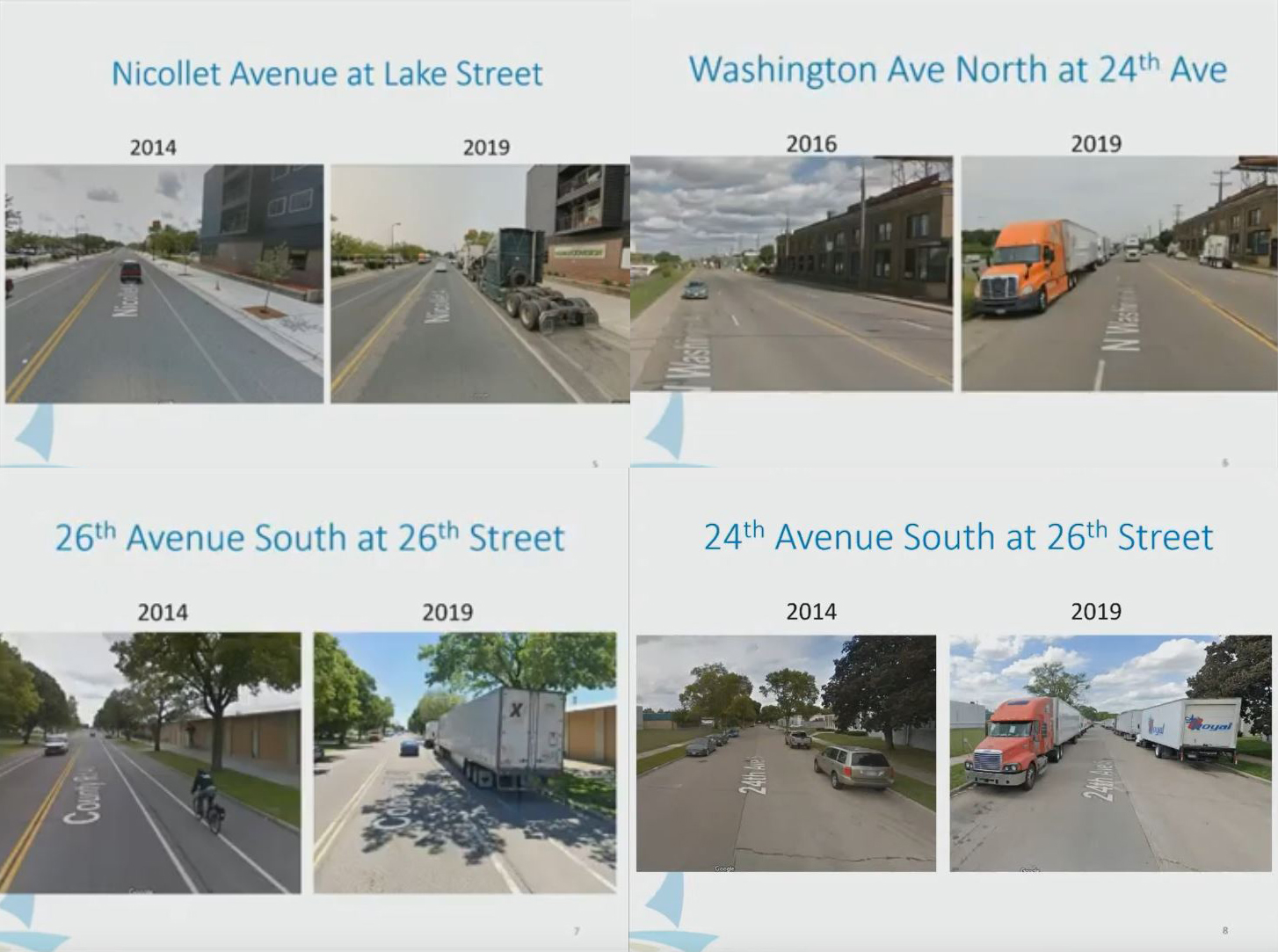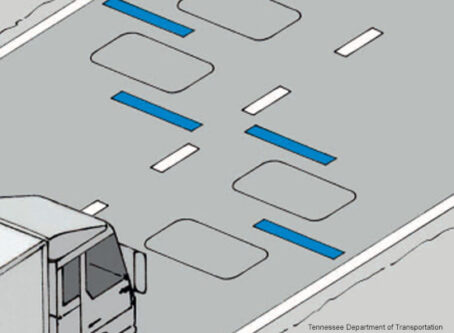Minneapolis’ proposed truck parking ban is shortsighted
Minneapolis’ meeting on a proposed truck parking ban is what one would expect: full of errors, misunderstandings and a complete lack of foresight.
On Wednesday, June 23, Minneapolis’ Transportation and Public Works Committee discussed proposed ordinance 2019-00855, which completely eliminates truck parking within city boundaries. What makes this issue somewhat unique is the fact that it is in response to legal truck parking, as opposed to the traditional complaints of illegal parking.
That aside, the arguments are pretty typical of the NIMBY culture we see at smaller city council meetings mulling over a proposed truck stop. A key difference here is the size of Minneapolis. That alone makes this particular truck parking ordinance concerning and indicative of nationwide problem.
Minneapolis’ truck parking problem
Ordinance 2019-00855 is not new. The Minneapolis city council got the wheels turning on this proposal back in August 2019. Since then, there have been workgroups, studies and public outreach, including input from the trucking industry. The pandemic put everything on pause for about a year, which brings us to the present day.
According to Dillon Fried, Minneapolis’ assistant parking systems manager at the Traffic and Parking Services Division, truck parking has not always been a problem. Fried showed images of streets in 2014 and 2019 to highlight that fact.

The city’s response to this issue is to just get rid of the trucks. If passed, the new ordinance prohibits vehicles over 26,000 pounds from parking “on any city street,” prohibits vehicles over 10,000 pounds from parking in residential zoning districts and increases the fine from $45 to $150 in the first year and to $250 thereafter.
That’s it. That’s the ordinance. Needless to say, there are many holes to poke here.
Where do the trucks go?
The most glaring problem with the proposed ordinance is the many unintended consequences not addressed in the proposed language. Most importantly, where are truckers supposed to park?
To start, truckers cannot park in nearby cities. Surrounding towns already ban truck parking, which has exacerbated Minneapolis’ parking problem. Rather than cut the head off the snake, Minneapolis wants to continue the trend of passing the buck by doing the same. It solves the problem for them, but creates further problems for truckers. Essentially, Minneapolis want to solve a problem by exacerbating another problem that is in dire need of a solution.
According to Fried, the following are potential solutions to where truckers can park:
- City has identified facility and licensing requirements for potential truck parking operations.
- Legislative agenda item was adopted to advocate regional solutions.
- Businesses can request adjacent streets to be signed as weight limit exception zones.
Addressing the first solution, the city is basically advocating for paid parking. In fact, Councilmember Cam Gordon even said many lots are available but property owners want to get paid. To no one’s surprise, truckers told Gordon paid parking is a no-go.
However, Gordon knows what he is talking about because he is a self-proclaimed truck parking expert. In fact, he has tried out “the app.” That’s right, not any truck parking app, but “THE” truck parking app.
As a truck parking expert, he should probably know there are many truck parking apps, the most popular of which is only used by 40% of truckers who use an app to park.
The second solution, advocating for regional solutions, is another passing of the buck. This time, Minneapolis wants the state to take care of its truck parking problem.
“Our understanding of this is that the truck parking issue is really a state and regional problem,” Fried said. “We feel that it needs a state and regional solution.”
Someone should probably tell him that the Minnesota Department of Transportation has already began that process back in 2019.
As for businesses applying for street exemptions, that sounds great in theory. In practice, how many of those requests will actually be granted? Probably not enough to put a dent in the truck parking problem in the area. Also, how many businesses would even bother? Too many shippers and receivers do not care about the truckers coming in and out of their facilities. If they did, more would allow truck parking in their lot, which would significantly reduce the nationwide crisis. But Truck Parking Expert Cam Gordon probably already knows that.
Shortsighted and full of unintended consequences
Minneapolis’ city leaders spent too much time looking at the current problem without considering the consequences of their proposed solution. The proposed ordinance states nothing about the effects of a truck parking ban. This was not lost on the committee.
Councilmember Steve Fletcher said he would not support the ordinance as it stands. His reasoning was mostly based on the fact it does not consider the long-term effect. Specifically, Fletcher said he was concerned about enforcement.
When Fletcher asked about enforcement, Jeff Miller of the city’s Regulatory Services Department said trucks will have 30 minutes to load or unload with a 5- to 10-minute grace period. After that, they try to find driver to find out how much longer he or she will be to see if they need an obstruction permit from Public Works. Fletcher called that process “muddy” and “concerning.”
Fletcher also is concerned about where truckers can go with an ordinance the city cannot even effectively enforce. He wants the authors of the ordinance to adjust the timeline to address these issues.
“We’re telling people they can’t park here, but we’re not addressing the issue of where are they supposed to put their vehicles,” Fletcher said.
City leaders are also concerned about equity. According to Fried, the truck parking problem in the city exists mostly in ACP50 areas, i.e., low-income neighborhoods. This creates another problem. Parking in upper-class neighborhoods is more or less a deadly sin. Middle-class neighborhoods? No chance. Working- and lower-class areas? Not fair due to equity. What’s left?
Ironically, Councilmember Jamal Osman said if the truck parking ban is passed, it will negatively impact minorities. Specifically, Department of Labor statistics show that 40% of drivers are people of color. Many local owner-operators and drivers are from immigrant communities. By passing the ordinance, Osman argued, the city is unfairly compromising the business of minorities in his jurisdiction.
Fate of truck parking in Minneapolis
The Transportation and Public Works Committee passed the ordinance to the full city council with four committee members for the measure, one abstaining. Fletcher’s vote was counted as absent after he lost connection the virtual meeting, but it would have passed anyway.
During the meeting, several members acknowledged the problems within the proposal. Namely, there needs to be a solution to the problem they will be creating with their solution to a problem. As one councilmember put it, the base ordinance needs to be refined to lessen the unintended consequences.
From here, the city council will consider the ordinance. Any number of things can happen, including passing the ordinance as is, vetoing the ordinance altogether, or going back to the drawing board and fixing the ordinance.
Stakeholders should also consider voicing their concerns.
On Thursday, June 24, Owner-Operator Independent Drivers Association President Todd Spencer sent a letter to the Minneapolis City Council urging them to reconsider the truck parking ordinance.
Spencer advocated working together with stakeholders to come up with a solution that satisfies everybody.
“While I have no doubt the city council is trying to address what it perceives to be a concerning issue, please remember that we are all in this together” Spencer stated in the letter. “Most truck drivers would much rather park at truck stops and rest areas that offer restrooms, food and water, and other basic amenities that most of us regularly take for granted. In other words, a lot of trucks probably park in Minneapolis because they simply lack any reasonable alternative. It’s not by choice or even design in most cases.”
Truckers can do their part by providing their expert knowledge to the city council, which they can reach at 612-673-3000. LL









